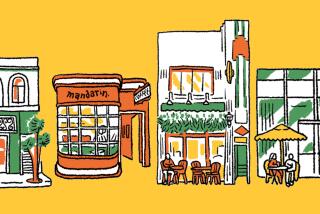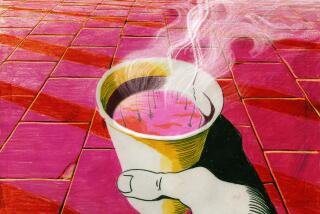The Coffee Revolution : Just a Cup Named Joe : . . . How It Came to Us
- Share via
The early history of coffee-drinking is vague, but one thing is certain: The often-told tale of a goatherd named Kaldi, who first brewed coffee upon noticing that his goats were lively all night long after eating coffee berries, is a recent invention. The early Arabic records never mention anybody named Kaldi--or any frisky goats, either.
Ralph S. Hattox studied the Arabic writings on coffee for his book “Coffee and Coffeehouses: the Origins of a Social Beverage in the Medieval Near East” (University of Washington, 1985). He found several different stories about how coffee-drinking originated, all pointing to Sufi mystics living in Yemen and their need to stay awake for their all-night prayer services.
According to one story, a 15th-Century Sufi named al-Dhabhani encountered coffee in Ethiopia--why he was there, and whether it was coffee prepared as a beverage rather than chewed as beans, the story doesn’t say. Anyway, when he fell ill after returning to Yemen, he called for coffee and found that it drove away fatigue. This, the story goes, is how coffee was introduced to the Sufis of Yemen.
The question is, how was he able to ask for coffee in Yemen if it weren’t already known there? According to another story, a 90-year-old man remembered that coffee-drinking first became known in Yemen during the mid-1400s and that the first person who made him coffee was a poor Sufi who also made coffee for al-Dhabhani. Put them together and these stories imply that some people were already drinking coffee in Yemen, but al-Dhabhani was the one who made it respectable.
Still another story says that in the early 1300s the Sufis of Yemen were already using another drink--a tea made from the leaves of the stimulant qat plant--for wakefulness. But qat doesn’t grow everywhere and so, says the story, an early 14th-Century Sufi named Ali ibn Umar al-Shadhili told his followers to make a tea of coffee bean husks instead. It is true that even today coffee husks, as well as coffee beans, are brewed into a beverage in Yemen, and another source does say husk coffee was consumed in Mecca about 20 years before bean coffee did.
At any rate, all the Arab writers agree that Sufis spread coffee-drinking to Mecca in the late 1400s, and then to Cairo, where the area around the al-Azhar Mosque sprouted coffeehouses around the year 1500. Once outside the context of religious ceremonies, however, coffee started to gather unsavory connotations. The Arabic name qahwa means “that which makes one able to do without something”--without sleep, obviously; but the word had previously been applied to wine, because wine was thought to substitute for food.
The feeble association with the forbidden drink wine, the fact that gambling (also forbidden to Muslims) and entertainers (considered to be of loose morals) were common in coffeehouses--as well as rulers’ fears that people who associate in the dead of night are probably up to no good--led to a series of crackdowns against coffee. In Mecca in 1511 and in Cairo in 1539, public coffeehouses were closed.
But there was no stopping coffee. The institution of the coffeehouse, apparently developed in Cairo in the early 1500s, was introduced to Turkey around 1555. Although coffeehouses were closed in Turkey from 1633 to the 1680s, the Turkish Ambassador to France made coffee fashionable among the French court by serving it to all visitors to his Paris home in 1669. That was during the reign of Louis XIV, the trend-setter for all of Europe, and by the beginning of the 18th-Century, coffeehouses could be found in all European countries.
The Dutch had already introduced coffee plants to Java in 1690, and the plants reached India in 1700. The Dutch also introduced coffee to Central America, and from there they naturally spread to the Caribbean and Brazil. Coffee was on its way to becoming the third largest commodity in international trade--after petroleum and strategic metals.
More to Read
Sign up for Essential California
The most important California stories and recommendations in your inbox every morning.
You may occasionally receive promotional content from the Los Angeles Times.













